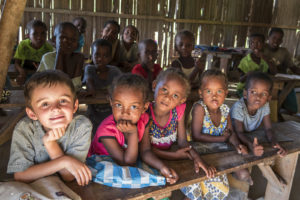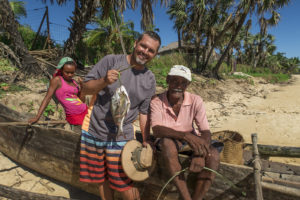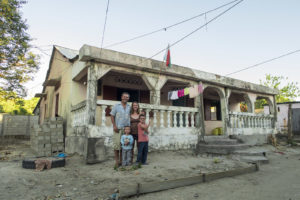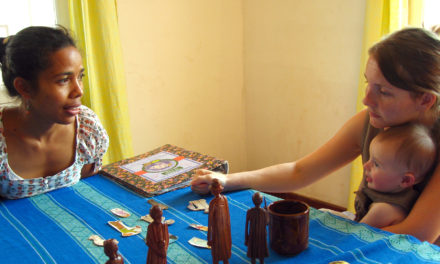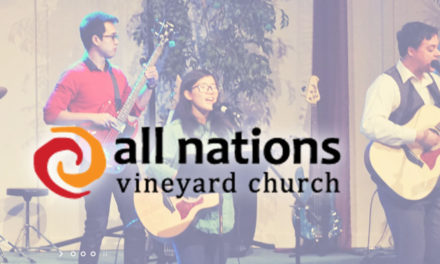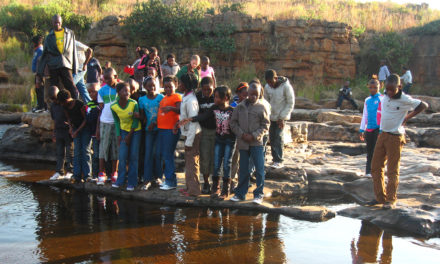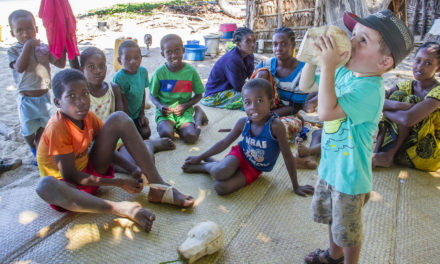S o much of the imagery we use when we talk about ministry is of things being built, of foundations, walls, and completed projects. We talk about tilling soil, planting seeds, seeing things sprout and grow, and finally of reaping harvests. There’s this idea that the work we do is a forward-moving progress, and while it may often be slow, at least the work that’s been done is done, and we’re now working to build on top of it. I wish that were always the case, or at least that it always appeared that way. Because sometimes, even in ministry, everything just falls apart. The foundation has crumbled, the walls have collapsed, the seed has rotted, and the sprouts are choked by weeds and burnt by the sun. Sometimes by the end, there’s nothing to show for our years of efforts. Progress, forward-movement, it seems, was just an illusion.
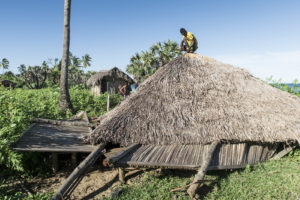
A couple years ago, our team’s meeting hut collapsed after a big windstorm. Now our ministry team itself has collapsed.
Over three months ago, our last remaining teammates on Nosy Mitsio announced to us that they were ending our team ministry. It came as a big surprise to us! We were unaware of any conflict with them, nor of any significant disagreement in values or ministry goals or strategies. It was also the week after our Malagasy YWAM co-worker, Narindra, told us that she really believed God wanted her to join our team on Nosy Mitsio (something for which we’d prayed and hoped for many years). That timing made our teammates’ announcement to end the team all the more devastating. We asked them many questions about why they chose this, but their short responses were vague and contradictory and quickly they told us they would no longer speak to us about it then or later. We were devastated! We didn’t even have time to process what it all meant!
Our former teammates insisted to us that, in spite of ending our team ministry, they would stay on Nosy Mitsio to do work on their own, separate from us. They also never suggested we leave Nosy Mitsio but spoke of our two families as “two different teams” doing separate work. However, one thing we knew is that ministry such as ours and in an unreached rural location such as Nosy Mitsio requires a deep unity among the Christians doing the ministry (such as you read about in John 17:20-23). We knew that disunity would likely destroy it. So we brought it to God in prayer.
For a long time prior to the end of our team, God had already been speaking to Lora about the need for our team to be deeply united in prayer in order to see a breakthrough among the Antakarana on Nosy Mitsio (as Lora wrote about in our last newsletter). And as we sought God over the following weeks and months after the end of our team, one thing that God spoke to both of us very clearly was that there was no way for the ministry on Nosy Mitsio to be fruitful with that sort of disunity – it was like crashing into a solid rock wall with no way forward. We also felt God showing us clearly that we couldn’t stay much longer on Nosy Mitsio with that disunity; that the longer we stayed, the less likely the future work there could be fruitful. We clearly received from God that we should just “let it go” – in particular, we needed to give it up the same way as in that story of King Solomon and the two mothers fighting over the living baby (1 Kings 3). Rather than cutting the ministry in half and each of us having half of a dead ministry, we needed to leave it behind in the hope that it might still live and be fruitful in the future.
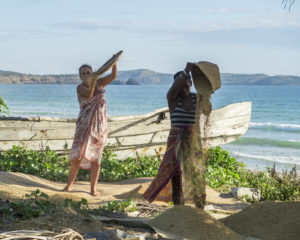
Lora helping to blow the chaff off the recent rice harvest, during our transitional time before moving off of Nosy Mitsio.
However, in our months of prayer, God never clearly showed us what to do instead. He didn’t tell us where to go or what to do next. For months, the only thing we heard in prayer was that the ministry needs unity and that we can’t stay long in disunity. (And how long is “not long” anyway? We didn’t know, but a few months seemed reasonable.) I held out hope that there might be reconciliation between us and our former teammates. However, I didn’t sense in prayer that God was asking us to wait on them in that hope, nor was there any outward indication that that might really happen. We were at a loss for what to do next, all the while seeing that what we had done for so many years was ended.
I n fact, the consequences of disunity which we feared began to manifest much more quickly than we would’ve expected. Initially, our former teammates agreed to continue meeting with us regularly for worship, but after just two weeks they ended that as well (though there is literally no one else on the entire island with which to have Christian fellowship). This was very obvious to the people of Nosy Mitsio, who for so long had seen us meet regularly for prayer and worship – they knew what we were doing and they always saw us since it was outside – and now they wondered why we stopped being seen together and what that meant about our faith. There were also other actions taken by our former teammates which further displayed to the local people the divide that had come between us. And as our former teammates rapidly decreased all aspects of their personal communication with us, eventually cutting off communication entirely, it made us more and more unable to provide positive answers to the community members’ questions of “what happened?” and “why?”.
So we made our preparations to leave. We spent a long period of time visiting all of the local villages, saying our goodbyes, and giving what minimal explanations we could in answer to their questions. Even in the midst of all of that, we continued to share Bible stories with people, to relate our own experiences to those of Jesus or to other truths from the Bible. But the people didn’t show any real interest. The only thing they really wanted to talk about was how horrible it was the way our teammates were ending things, and why. And can I blame them? The central theme of our Bible story set that we translated into the Antakarana language was how man’s bad decisions separate us from God, but God continuously pursues man to reconcile us to him. And here they see the very people who brought that message, who should be following it in their own lives, they see us in a situation where reconciliation is obviously denied. Not only denied, not only in contrast with the Bible stories we’ve shared, but rejected in such a multitude of ways that are blatantly immoral even in their own non-Christian culture. What weight could our stories about Jesus still have, when they weren’t seeing them lived out? The truth is that what we display speaks so much more loudly than what we say, and this is true on Nosy Mitsio even more than it is in America. And as a team we were no longer displaying anything that looked like “good news”. Our message, our proclamation, was rendered worthless.
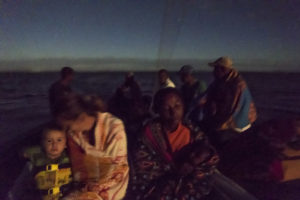
Our family’s last trip out to Nosy Mitsio, sailing with a local boat in the very early morning hours.
That’s a weight that we’ve carried on our shoulders for months now. Not only did we lack any success in seeing people convinced of God’s goodness in Jesus, but our team’s sharing of the Gospel was eventually so contrasted by our team’s actions that the Gospel itself was made to look like bad news. It’s possible that the result of our years of efforts and investment was that we made it harder for the people of Nosy Mitsio to choose to follow Jesus.
We did our best to proclaim Jesus until the end, acknowledging that bad things happened in his life, even that Jesus’s own followers momentarily denied him and contributed to his betrayal – but God still reconciled them to himself. We said that there was still hope, that God’s goodness triumphs over man’s mistakes and bad decisions. And I believe that. But can the people of Nosy Mitsio see that? Or did they see the opposite? I wish I knew.
I n 2012, nearly six years ago, we began our preparations for initiating ministry on Nosy Mitsio. Five years ago we moved there as a family and prepared the way for our team. Over three years ago, our team of three more families and two single ladies arrived and we spent the next two years teaching and training them and leading them exhaustively. Nearly all left after those two years, but we still had hope for the future ministry as we still had one family returning to ministry together with us. We were just about to finally include a Malagasy teammate (to start growing our team again) and then the team ended. Not only did the team ministry end, but it collapsed spectacularly – it fell apart into a big heap of rubble that appears to have left more of a mess there than there was to begin with.
What do we do with this? For us, I think nothing. I think there is nothing positive that we can do with this. All our years of exhausting effort appear to have been entirely wasted. All our hopes appear to have been dashed.
But there is a phrase common to Christianity these days (who knows who coined it) that, “He wastes nothing.” It probably comes primarily from this verse in Romans 8:28
Indeed, that’s a Bible verse we’ve been leaning heavily upon during this time. But it’s not just this verse which would indicate to us that God wastes nothing, that he uses even bad circumstances, wrapping them all up in his divine will to work things out for the best. The whole Bible, and each of the stories within it, tells this same story. You really can’t read a Bible story without realizing that the characters are flawed, the decisions made are poor, and generally we just keep messing stuff up. And God acts, “Deus ex machina,” and he redeems, restores, and makes it new, according to the way he wanted it to be all along. We see in the Bible that usually God acts through people – through these same flawed, broken vessels that messed stuff up in the first place. We see that out of all the rubble and mess that we create, he picks up the pieces and uses them to build an even more beautiful creation. Like all the pieces of pottery and tile that are shattered by neglect or violence, and which can then be re-purposed to create a giant mosaic that’s even more remarkable than any intact tile could have been.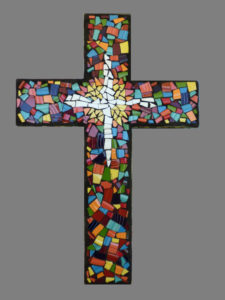
We see all this no more clearly than in Jesus’s death and resurrection. When Jesus was at the peak of his ministry, less than a week after his triumphal entry into Jerusalem, it all fell apart. Jesus suffered betrayal from those closest to him and his disciples scattered, he was entirely rejected by the religious leaders of his people, and finally he was crucified – politically condemned and executed by the state. Everything that could go wrong for Jesus did. The worst that people could offer was poured out upon him. It seemed like his years of effort, indeed the entire purpose of his life, was wasted upon the cross. What a spectacular failure!
And yet Jesus’s death was the means by which death itself was defeated. Sin itself was crucified upon his cross, to no longer have final dominion over us. The worst that the world could offer, our centuries and millennia of flawed, self-centered, poor decision-making was exhausted upon the cross. And it still wasn’t enough to extinguish God’s goodness. Jesus rose again, and ever since the cross has become a symbol of hope. The cross now proves to us that no matter how bad we are, no matter how much we mess things up for ourselves or for others, God’s goodness is greater and it will triumph. God’s actions like this don’t excuse our mistakes, but it overwhelms them. In the same way we hope, we have faith, that all that appears wasted in our lives is not, that God will build something even more beautiful from the broken pieces.
N ot long ago, while continuing to pray and seek God’s direction about what to actually do next in response to this mess, I felt the Holy Spirit reminding me of the parable of the talents (Matthew 25). I believe God was speaking to me that he’s given us what we need: knowledge, experience, wisdom, and hearts for him, such that we can “invest” wisely and see it grow and produce for him. I also specifically felt the Holy Spirit speaking that he is “pleased” with our “decisions” or “decision-making”. So we believe that God was telling us that he’s given us all we need to make the next decision for him and that he’s entrusting us to do so.
In truth, God really has given us much over these years! He’s given us a good ability to speak and understand the Antakarana language. He’s given us the opportunity to learn much of their worldview and customs and religious beliefs. He’s given us the beginning of a good network of relationships with local people in northern Madagascar including one very faithful Antakarana Christian friend. He’s given our team the invaluable resource of a translated Bible story set in the Antakarana language – something that can be used for evangelizing Antakarana anywhere and the truth it contains can’t be ultimately extinguished by any of our mistakes. He’s even given us plenty of experience and (we hope) wisdom in how to participate in team ministry – even if most of what we’ve learned was through mistakes, still we’ve learned. God has given us a lot that we can invest towards his purposes of bringing the Antakarana people into his Kingdom.
While Nosy Mitsio was certainly where we set down roots and where for years we invested heavily and exhaustively in ministry efforts like we’ve never done before, it was never the final goal. Nosy Mitsio was hoped to be a starting point for ministry to the Antakarana, a point from which Antakarana believers and churches could multiply and spread throughout all of their tribe (and neighboring tribes) in northern Madagascar. So the end of our team ministry on Nosy Mitsio was not the end of God’s leading on us to reach the Antakarana people.
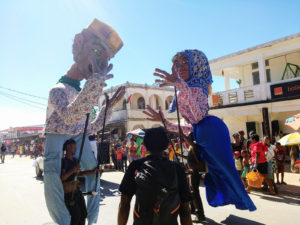
Giant Antakarana “marionettes” leading the parade for Independence Day along the main street of Ambilobe.
The Antakarana people are a fairly large tribe, some estimates would say as many as 400,000 people, and they’re spread all over northern Madagascar. The small island of Nosy Mitsio is significant to Antakarana tribal history and thus their cultural heritage, but it’s otherwise very isolated and not centrally located to the Antakarana people as a whole. On the other hand, Ambilobe, the nearest town on the mainland where for years we’ve made regular visits to buy monthly supplies, is quite centrally located to the Antakarana. This mid-sized town is itself at the primary crossroads for all the major population centers in the far north of Madagascar. Being an urban center, the people living in Ambilobe are mixed from many tribes throughout Madagascar, but the majority tribe is still Antakarana people. Ambilobe is also surrounded by a very large number of villages in the area, branching out in many different directions, most of which are likely populated by primarily Antakarana people.
Ambilobe itself would be considered “reached” by the Gospel, because there are several well-established churches here, and with the great mix of population, every neighborhood surely has a number of Malagasy Christians (usually all from more distant tribes though). However, as is the custom for nearly every church in Madagascar, worship and teaching is done in the “official” Malagasy language, a language which the vast majority of Antakarana people don’t understand and which many of them despise. The most highly-educated people in towns (such as Ambilobe) usually understand official Malagasy, so there is some opportunity that there are a few Antakarana Christians in the churches here, worshiping in a language that is essentially foreign to them. But this is why there are so few churches (often none) in rural Antakarana areas such as Nosy Mitsio: neither can most of the people understand what happens in the church nor the stories that are being told there, nor is Christianity in its commonly foreign cultural appearance seen as being an acceptable choice within their tribal heritage. There is without a doubt a great need for simple, reproducible indigenous churches in the local language that can be spread even to rural Antakarana villages and which can subsequently be multiplied further.
S o just a week ago, we moved off of Nosy Mitsio and moved into a rented house here in Ambilobe. Right now, other than settling in, we hope to spend our initial time developing relationships, meeting people throughout town, and hopefully making trips to the surrounding rural areas to get more of an idea of where people are living and where they’re still unreached. From a central location like Ambilobe there are many opportunities for different ministry strategies and we intend to consider and try out some different efforts than we’ve done in the past, to see if some of them would be more effective in this area.
Of course there are also plenty of opportunities for evangelism and discipleship here in town, and our translated Bible story set might even find a more eager audience here. We also hope to regularly visit the churches that are already established here, to see if we can help promote a vision for local outreach and also perhaps meet some Antakarana people who are already Christians and who might be interested in having a regular Christian fellowship in their language, and to see if God would call any of them to reach others in their tribe. All of our efforts here and in the surrounding areas will be with the same goal we’ve had for so long: planting reproducible indigenous churches that can multiply among the Antakarana people, especially that can reach those in the rural areas who’ve never yet had a chance to hear the Gospel.
All things considered, and even though the situation that brought us here was a heartbreaking mess, I think we’re off to a good start here in town! We received a very warm welcome when we arrived, including one neighbor helping us (without being asked) to move our things into our new home. We share a yard with several other Malagasy families whose homes face ours and they’re all very friendly and have children that our kids can play with anytime. When we’ve visited Ambilobe in the past, I often run into people who I met previously, but who I forgot. Now, in just the few days since we’ve moved here, that seems multiplied – so many people greeting me, knowing my name, and talking to me, but far far more than I can remember having ever met before. We also have a number of people on Nosy Mitsio who say they will come visit us when they pass through Ambilobe, and we’ve offered to host any of them any time in our new home.
Best of all is our good friend, Nuckiline, our Antakarana Christian friend who lives here in Ambilobe, and who helped us make arrangements for our move and who continues to be an unfailingly great support to us in all of our efforts. She’s been a huge encouragement to us during this transitional time. And through her work she has a very wide network of contacts in the surrounding areas that she hopes to use to help us engage in ministry here.
On top of all that, Narindra (our YWAM colleague) very recently told us that she hopes to join our team here in Ambilobe soon! We’ll discuss the details with her more when we see her in Tana (the capital city) next week, but this is very exciting news! We hope and pray that God will continue to re-grow our team with more committed workers, those that he’s called to reach the Antakarana people for his Kingdom.
S o that’s our news. That’s what happens when things fall apart. It often feels and looks hopeless and wasted. And truthfully, there’s very little positive that we can see from the years of our efforts on Nosy Mitsio. But thank God that what we see isn’t all there is to it. “So we fix our eyes not on what is seen, but on what is unseen, since what is seen is temporary, but what is unseen is eternal.” (2 Cor 4:18) We trust that God is taking our mess, this big pile of rubble that resulted from disunity in the team ministry on Nosy Mitsio, and that he’s selecting every piece, finding the perfect place for it, and fashioning it into something new and even more beautiful than we could imagine.
Please pray for us in this new season, that we will be refreshed, renewed, and restored. Pray that God will show us clearly where he’s working and what his plans are for reaching the Antakarana people in this area, and that he would show us what part he’d like us to play in it.
Pray for the people of Nosy Mitsio, that what has happened isn’t the end for them, and that God’s voice of truth and love won’t be silenced by man’s mistakes. Pray for our former teammates, in their new season of incredible difficulty as they attempt ministry alone on Nosy Mitsio without any local support or accountability. Pray that God will also renew and restore them and even bring a reconciliation between us all as brothers and sisters in Christ.
There’s a song I’ve loved ever since my high school days that ends with these lyrics:
“I’ve heard it said that he wastes nothing,
so beautiful to behold,
the Author of my hope is writing,
the greatest story ever told!”
In Christ,
Adam, Lora, Matimu, and David
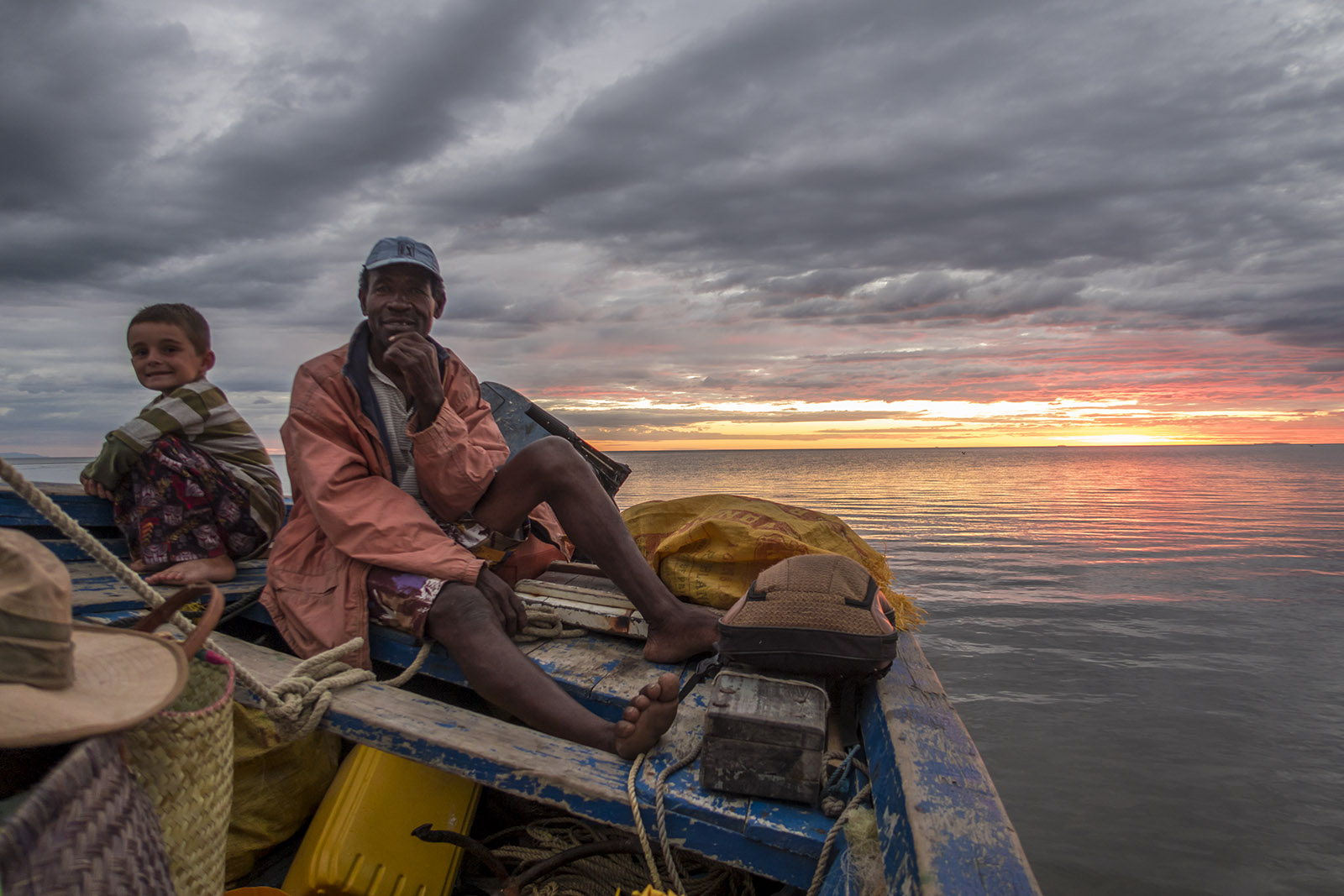
The evening we moved off of Nosy Mitsio. The tide was low so we were stuck at the mouth of the river that enters the Port until about midnight. But at least we were treated to another beautiful sunset!

